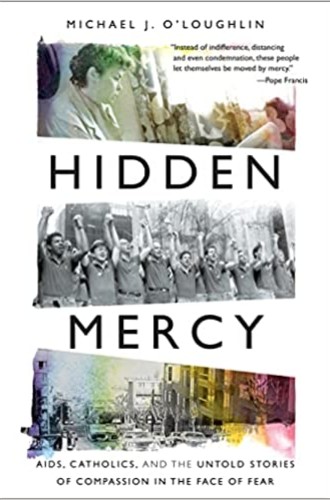Catholic acts of mercy during the AIDS crisis
Michael O’Loughlin paints a vivid portrait of the complex, compassionate, and sometimes daring ways individual Catholics responded.
Many pastors and congregations who ministered to people suffering from HIV and AIDS during the 1980s and ‘90s were deeply shaped by the experience. A Manhattan congregation I used to attend still hosts a monthly dinner gathering for HIV-positive individuals, a ministry that began when few churches welcomed AIDS patients. In the mid-1980s, church members would walk a few blocks from the church to a local hospital to visit AIDS patients after services. Debates over the common cup in communion as the AIDS crisis hit are buried in the council notes of another parish, where I served as vicar. Despite these debates, the organist there has fond memories of how the congregation supported him as his partner died of AIDS.
Hidden Mercy focuses on how Catholics found resources within their tradition to minister to HIV-positive patients with compassion and care during the AIDS crisis. It’s important to document this effort while those who participated are still alive. Rather than attempt a comprehensive history of Catholic responses to AIDS, as others have done, Michael O’Loughlin gives readers a collection of snapshots, telling the stories of individuals and organizations who bravely ministered in ways they considered faithful to their understanding of Catholic tradition. He names this reality with theological sensitivity while also capturing the pathos and passion of the people he discusses.
O’Loughlin paints a vivid portrait of the complex, compassionate, and sometimes daring ways that Catholics responded to the AIDS crisis not only in major urban centers but also in smaller towns. Some engaged in this ministry because they saw it as an outgrowth of their faith’s central teachings. Comforting the sick, after all, is one of the seven corporal works of mercy.






